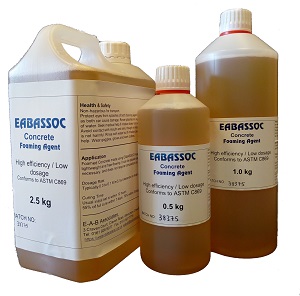Concrete is a fundamental building material known for its strength and durability. However, to enhance its versatility and adaptability, various additives and agents are used in its formulation. One such crucial component is the foaming agent. In this article, we will explore the role of foaming agents in concrete, their types, applications, and the factors affecting their cost.
Foaming Agent in Concrete
Definition and Function
Foaming agents, also known as air-entraining agents, are chemical substances added to concrete mixtures to create stable and uniform air bubbles within the mixture. These air bubbles act as tiny voids within the concrete, significantly improving its properties.
Types of Foaming Agents
There are two primary types of foaming agents used in concrete:
- Synthetic Foaming Agents: These are chemically engineered compounds designed to create consistent and predictable air voids in concrete. They offer precise control over the bubble size and distribution.
- Natural Foaming Agents: Derived from organic sources, natural foaming agents are often based on protein or sugar compounds. They are more environmentally friendly but may provide slightly less control over air bubble characteristics compared to synthetic alternatives.
Applications of Foaming Agents
Lightweight Concrete
The primary application of foaming agents is in the production of lightweight concrete. By incorporating air bubbles into the mixture, the overall density of the concrete is reduced. This results in a material that is easier to work with, offers improved insulation properties, and can be more cost-effective in certain applications.
Reducing Shrinkage
Foamed concrete also helps reduce shrinkage during the curing process. This is particularly beneficial in applications where cracking due to shrinkage could compromise the structural integrity of the concrete.
Factors Affecting the Cost of Foaming Agents
The cost of foaming agents in concrete production can vary significantly based on several factors:
1. Quality and Brand
High-quality foaming agents from reputable brands often come at a premium price due to their consistent performance and reliability.
2. Efficiency
Efficient foaming agents that require lower dosages to achieve the desired air content can reduce overall costs.
3. Quantity
The volume of foaming agent needed for a specific project directly impacts the cost. Larger projects may require higher quantities and, consequently, a higher overall cost.
4. Material Specifics
The choice between synthetic and natural foaming agents can influence cost, with synthetic agents generally being more expensive.
5. Customization
Customized foaming agents designed for specific applications may come at a higher cost but can offer tailored solutions for unique projects.

Concrete Foam Agent Price
For information on concrete foam agent prices and product options, you can visit CABR Concrete Additives. They offer a variety of concrete additives, including foaming agents, with detailed specifications and pricing information on their website.
In conclusion, foaming agents play a crucial role in enhancing the properties and versatility of concrete. Understanding the types, applications, and factors affecting their cost is essential for making informed decisions in construction projects. By carefully selecting the right foaming agent, you can achieve the desired concrete properties while managing your budget effectively.